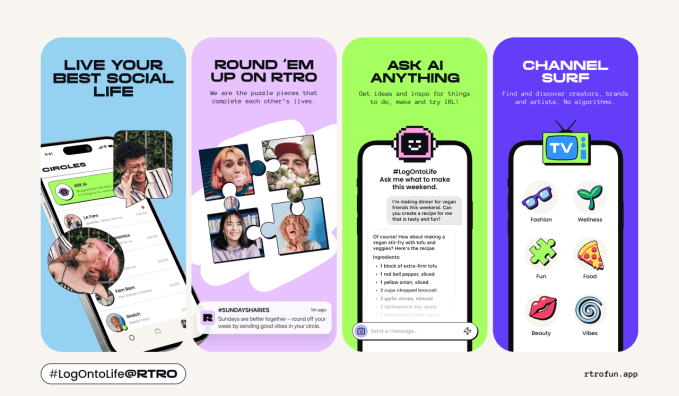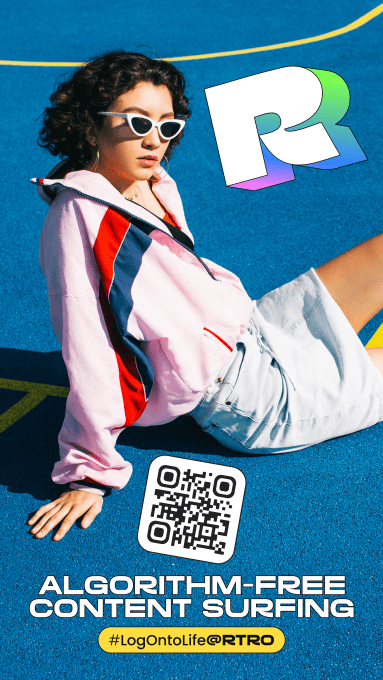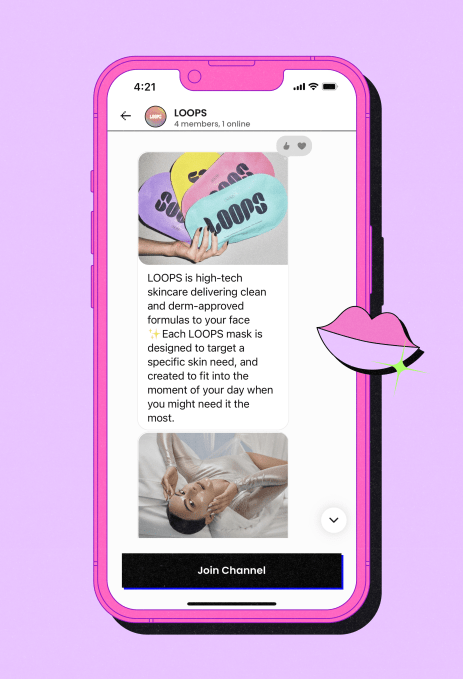Ahead of Meta’s launch of a text-based social network, female-founded social networking startup RTRO is launching its app this week with the goal of connecting brands, creators, and their fans and followers in a more positive environment focused on human connections and communities, not algorithm-driven content. To accomplish this, RTRO divides its social experience into two parts — on one side, you can keep up with friends or family in RTRO’s “circles.” On the other side, users can switch over to see content from creators and brands in their own space.
In addition, RTRO claims to offer robust content moderation features that focus on keeping the app free from bullying and toxicity and the ability to interact with ChatGPT.
Founded by two tech and marketing veterans, the startup’s approach to social is one that aims to take users back to a simpler time when social networks were focused more on sharing real content and making connections with other people. This nostalgia for earlier days is reflected in the app’s name, “RTRO,” a misspelling of “retro.”
After polling Gen Z and Millennial users, the team found that people’s top complaints about today’s social media apps were about the number of brand ads showing up in users’ feeds and the algorithm-driven experience. But people also said they wanted to use social media to stay connected with others they care about and to view entertaining content.
Brands, too, had shared their own complaints about modern social media, RTRO’s founders explained.

With a background in experiential marketing, co-founders Nicole Falco and Tristan Brennan had worked with hundreds of Fortune 500 and 1000 brands over the years, including at Brennan’s marketing agency TH Experiential. This work included the creation of several digital products, apps and websites for brands to engage with customers globally. But the brands would often express to them their confusion and frustration around integrating social into their campaigns.
“TikTok is still a little bit of a mystery for them, and then on [Instagram], ever-changing rules and ever-changing features and algorithms just make it a challenge for brands to figure out how to get in front of who they need to,” said Falco.
These complaints from both users and brands got the founders thinking about how they can create something better.
“We were looking at social media through the lens of the human experience, and how can we make it a little better, and also through the lens of technology, what technology can be leveraged?”

The end result is RTRO, a social app where you can toggle between your personal connections and brand and creator content, as they each have their own spaces. On the personal side, there aren’t any brands interrupting the experience — however, they do have a way to stay involved. RTRO prompts users a few times a week to post — encouraging posts of affirmations, GIFs, or updates about what you’re doing in real life (hashtagged as #LogOntoLife). Brands can sponsor these prompts, if they choose.
Meanwhile, the other side of the app — aka RTRO TV — is an algorithm-free space where brands and creators intersect with their audience in a chat-style environment. At launch, RTRO has around 50 TikTok and Instagram creators making content for the app. Users can react to their posts, like giving it a thumbs up, but not message or comment. To engage with RTRO TV, users browse through various “channels” dedicated to topics like travel, food, beauty, and more. This puts users more in control of what sort of content they see in their feeds, the company says.
“You can go to that channel and you can explore brand and creator content — so you’re in full control of seeing what you want to see. This is completely new. This type of experience does not currently exist in an app,” Falco touts.
However, the offering is similar in some ways to TikTok’s test of dedicated, topical feeds.
In addition, creators can choose to create a private circle and post to it within their channel space. When finished, they can turn the circle off. Creators can also block users from messaging in the circle or remove them if they’re being hateful or toxic.
Creators RTRO has tested with said they liked the ability to have more personal and casual conversations with followers.
“In these channels, people with several hundred thousand followers are finding they can post one post to Instagram a day — it has a very tailored image,” says Brennan. But in the channels, they can now post many times a day, he explains. “They can have an informal conversation. It doesn’t have to feel so official [or like] their one moment to stand out. It creates something that’s a bit more personal,” he continues. “We’re finding the same thing with brands, too. They’re not just posting something to promote their products. They’re talking about their internal teams or culture, what they’re doing today…there’s something unique about having something that feels a little less official.”
Brands testing RTRO include Alastin Skincare, KISS Nails, Loops Beauty, Halo 42, JOAH, and others.

Another feature allows users to interact with ChatGPT through an integration that lets them ask the AI for ideas and inspiration — something that could be another test case for how consumers might respond to AI in a social networking setting. So far, that’s been a bust for Snapchat — where its users recently panned the app’s introduction of the My AI feature, dubbing it “creepy” and asking for its removal.
Other apps have seen better luck merging AI and social. Ghost’s mobile messaging app that allows friends to post anonymously in group chat just rolled out an iMessage extension and added functionality that lets users create mini-apps using ChatGPT. The app then moved into the No. 5 spot in the Social Category on Apple’s iMessage App Store.
To get RTRO’s app off the ground, the team worked with an outsourced firm, but its in-house CTO has previously created a number of consumer digital experience and mobile apps for larger companies like Microsoft, Amazon, iHeartMedia, CLEAR, WeWork, and Grailed. The startup aims to bring the outsourced team in-house as well at some point in the future, and says those talks are already underway.
The company has not yet shared its revenue model plans, but aims to release that part of its strategy in the next quarter or so.
RTRO, a remotely distributed team of under a dozen, is currently backed by angel funding only, including investment from both co-founders. No pre-seed or seed funding has yet been raised.
RTRO is a free download on the App Store.
Credit: Source link


Comments are closed.